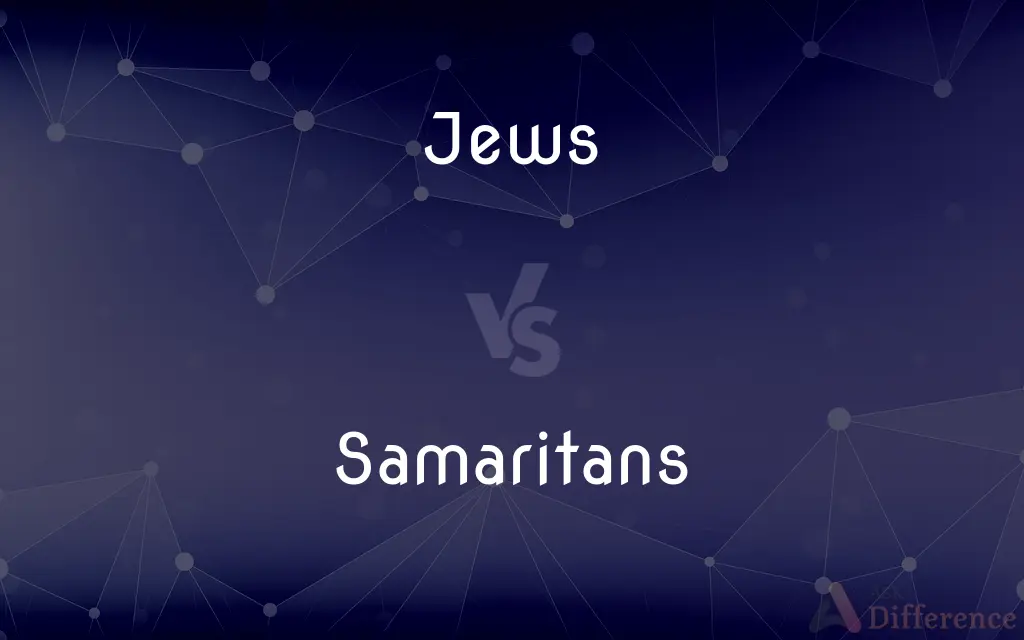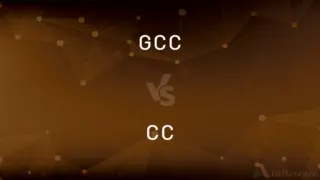Jews vs. Samaritans — What's the Difference?
Edited by Tayyaba Rehman — By Fiza Rafique — Published on December 15, 2023
Jews are descendants of Abraham, Isaac, and Jacob; Samaritans trace lineage to Ephraim and Manasseh. Both share ancient Israelite heritage but have distinct religious beliefs and practices.

Difference Between Jews and Samaritans
Table of Contents
ADVERTISEMENT
Key Differences
Jews traditionally trace their lineage to the patriarchs Abraham, Isaac, and Jacob, and are associated with the southern Kingdom of Judah. Samaritans, on the other hand, believe they descend from the tribes of Ephraim and Manasseh and are associated with the northern Kingdom of Israel.
Historically, the division between Jews and Samaritans intensified after the split of the ancient Kingdom of Israel. Jews remained in the southern region, evolving their distinct religious practices, while Samaritans developed their own religious customs in the north.
When it comes to scripture, Jews recognize the Tanakh, which includes the Torah, Prophets, and Writings. Samaritans, however, solely adhere to the Samaritan Pentateuch, their version of the Torah, with differences from the Jewish text.
Over time, cultural and religious differences grew between Jews and Samaritans, leading to mutual animosity. The tension was evident even in the New Testament, where interactions between Jews and Samaritans showcased deep-seated biases.
Jews today encompass a wide range of ethnicities and traditions, spanning communities worldwide. Samaritans, conversely, are a much smaller community, primarily residing in parts of modern-day Israel and the West Bank.
ADVERTISEMENT
Comparison Chart
Origins
Descend from Abraham, Isaac, Jacob
Descend from tribes of Ephraim and Manasseh
Associated Kingdom
Kingdom of Judah (South)
Kingdom of Israel (North)
Scriptures
Recognize the Tanakh
Solely use the Samaritan Pentateuch
Current Population
Diverse, globally spread communities
Smaller, in Israel & West Bank
Historical Relations
Separate identity post Israel's split
Developed distinct religious practices
Compare with Definitions
Jews
Adherents to Judaism's teachings and customs.
Jews read from the Torah during synagogue services.
Samaritans
Adherents of the Samaritan faith.
Samaritans use their version of the Pentateuch for religious teachings.
Jews
Descendants of the biblical patriarchs.
Jews trace their ancestry back to Abraham, Isaac, and Jacob.
Samaritans
Descendants from the tribes of Ephraim and Manasseh.
Samaritans believe they've preserved the ancient Israelite tradition.
Jews
Members of the Jewish religion and/or ethnicity.
Many Jews celebrate the Sabbath from Friday evening to Saturday night.
Samaritans
A minority group in modern-day Israel and the West Bank.
There are only a few hundred Samaritans left today.
Jews
A diverse global community with shared heritage.
Jews worldwide come together to celebrate Passover.
Samaritans
People associated with the ancient northern Kingdom of Israel.
Samaritans have distinct customs that differ from mainstream Judaism.
Jews
People from the historic southern Kingdom of Judah.
The Jews remained in Judah after the kingdom's split.
Samaritans
A native or inhabitant of Samaria.
Jews
To bargain shrewdly or unfairly with. Often used with down.
Samaritans
A member of a people inhabiting present-day Israel and the West Bank who trace their ancestry to the ancient Israelites and practice a religion related to pre-rabbinical Judaism.
Jews
An adherent of Judaism as a religion or culture.
Samaritans
Often samaritan A Good Samaritan.
Jews
A member of the widely dispersed people originally descended from the ancient Hebrews and sharing an ethnic heritage based on Judaism.
Samaritans
Of or relating to Samaria or to Samaritans.
Jews
Plural of jew
Samaritans
Plural of samaritan
Jews
Nonstandard spelling of Jews
Samaritans
Those with distinct religious rituals and festivals.
Samaritans celebrate Passover on Mount Gerizim.
Jews
To haggle so as to reduce (a price). Often used with down.
Jews
A native or inhabitant of the ancient kingdom of Judah.
Common Curiosities
Where can one find Samaritans today?
Samaritans primarily reside in modern-day Israel and the West Bank.
Who are the Samaritans?
Samaritans are an ancient religious group associated with the northern Kingdom of Israel.
Why was there tension between Jews and Samaritans?
Historical, religious, and cultural differences have led to mutual biases between Jews and Samaritans.
Who are the Jews historically?
Jews trace their origins to the biblical patriarchs: Abraham, Isaac, and Jacob.
Do Jews and Samaritans share scriptures?
Both have versions of the Torah, but Samaritans solely adhere to the Samaritan Pentateuch, while Jews recognize the broader Tanakh.
What scripture do Samaritans follow?
Samaritans follow the Samaritan Pentateuch, their version of the Torah.
What is the historical homeland for Jews and Samaritans?
Jews associate with the southern Kingdom of Judah, and Samaritans with the northern Kingdom of Israel.
Are Samaritans a type of Jews?
No, while both share an ancient Israelite heritage, Jews and Samaritans have distinct identities and beliefs.
How do the customs of Jews and Samaritans differ?
Both have unique rituals, festivals, and practices rooted in their distinct religious traditions.
Were Jews and Samaritans ever united?
Originally, they were part of united ancient Israel, but post the kingdom's split, they developed separate identities.
Is the Samaritan Pentateuch the same as the Jewish Torah?
While they share many similarities, there are differences in content and interpretation between the two.
Do Jews and Samaritans have common festivals?
They share some festivals like Passover, but the observance and practices can differ significantly.
What are the key religious texts for Jews?
Jews recognize the Tanakh, which includes the Torah, Prophets, and Writings.
How diverse are the Jews globally?
Jews form a diverse global community with various ethnicities, traditions, and communities worldwide.
Are there any Samaritans left today?
Yes, but they are a small community, primarily in Israel and the West Bank.
Share Your Discovery

Previous Comparison
GCC vs. CC
Next Comparison
R vs. TV-MAAuthor Spotlight
Written by
Fiza RafiqueFiza Rafique is a skilled content writer at AskDifference.com, where she meticulously refines and enhances written pieces. Drawing from her vast editorial expertise, Fiza ensures clarity, accuracy, and precision in every article. Passionate about language, she continually seeks to elevate the quality of content for readers worldwide.
Edited by
Tayyaba RehmanTayyaba Rehman is a distinguished writer, currently serving as a primary contributor to askdifference.com. As a researcher in semantics and etymology, Tayyaba's passion for the complexity of languages and their distinctions has found a perfect home on the platform. Tayyaba delves into the intricacies of language, distinguishing between commonly confused words and phrases, thereby providing clarity for readers worldwide.












































